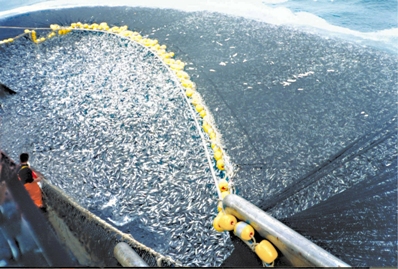 Every time I watch a documentary about over fishing and the complete disregard for our future selves, it makes me sad, angry, and makes me want to do something about it. I recently watched one with incredible camera work and explanations of many common commercial fishing methods. It included details on how long-line fishing effects bird population and how nets the size of a city block in all directions were used to capture 150 tons of tuna and everything else that just happened to be there. A comparison was made that it used to take a similar sized vessel over a year to make that catch and now it can be set up in a matter of hours.
Every time I watch a documentary about over fishing and the complete disregard for our future selves, it makes me sad, angry, and makes me want to do something about it. I recently watched one with incredible camera work and explanations of many common commercial fishing methods. It included details on how long-line fishing effects bird population and how nets the size of a city block in all directions were used to capture 150 tons of tuna and everything else that just happened to be there. A comparison was made that it used to take a similar sized vessel over a year to make that catch and now it can be set up in a matter of hours.
Running my regular emotional pattern, I got sad, angry, and I thought that I should do something about it. The feeling eventually passed as it always does, but I decided to do more thinking about the human behavior that’s involved. Much of the way we behave is does well in small tribes in situations where food is sparse. They are characteristics that made our species thrive. This served humans very well 60-70 thousand years ago, when we were living in small tribes and the results of hunting were inconsistently good at best.
Now it’s a different story. With plenty of food available, it doesn’t make sense to eat everything and bulk up for the winter or long time before the next meal. However, evolving into the advanced species that we are doesn’t mean that traits that no longer serve us well have naturally, sexually or non-naturally been selected out. This means that we have to think our way out of what feels natural. A very tall order for most.
But I digress. As our species advanced, there was an advantage in sexual selection to be a good provider. Many centuries and millenia ago, it may have made the difference between life and death. As food became more plenty, the key differentiation became material possessions and its ability to indicate how good of a provider one is. The word “differentiation” itself is the key here. Even among material possessions, there is a hierarchy.
Watching sharks get slaughtered for only their fins reminded me of this. It’s not enough that someone can boast an ability to provide by feeding himself and others. An ability to do something in a way that others can’t is the key. The “delicacy” (emphasis is mine since I never considered it as such) of shark fin soup is the perfect example. It’s a delicacy because of it used to be a rarity. It was most likely harder to catch a shark without the modern methods we have now. It’s odd that the high price stuck and so did the idea of it being a delicacy even though it’s widely available now.
Sharks are just one example. And the over-fishing of sharks ties into people not being able to save for a simple reason. We have not evolved to act in our best long term interests. Evolution has always favored doing everything possible as quickly as possible to demonstrate reproductive worthiness and propagate. This demonstration of worthiness can be anything from being able to serve or eat shark fin soup or spending money on fancy clothes, house and car. A spending of money that doesn’t necessarily prepare us well for the future.
Similarly, sharks will be over fished for the simple reason that as constructive for future generations as it may be, sustainable fishing or even fishing in a way that promotes growth doesn’t meet the needs of the communal psyche and it’s demands for perceived differentiation. Oddly it would serve the purpose of differentiation much better if we did only fish a percentage of the shark population growth rate. Every year there would be more to fish and to top it off, the smaller supply would create a rarity that would increase the status of those who possess it.
I know it can go on ad nauseam about why a change that I see as positive can’t be done. In reality, I really don’t care. This has all been an exercise in applying an understanding of how we evolved and how and why people behave the way they do to a particular observation that seemingly has little to do with those subjects.
Instead of leaving on such a negative note, perhaps it’s best to focus on the things that we can change. Even with what appears to be chaos all around us, focusing on what will get us what we really want is powerful and leads to excellent results. Are you doing everything you can to get what you want most?







